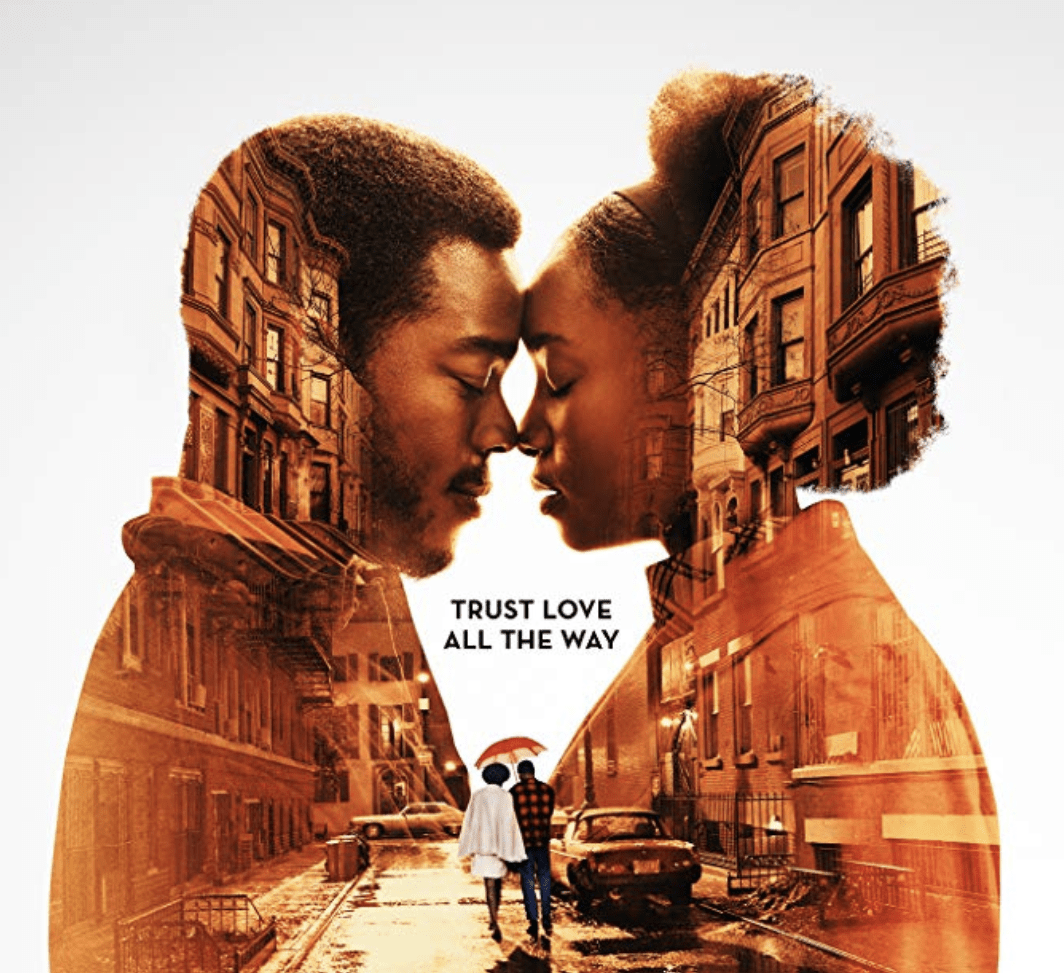As rapturously stylized and romantic as an urban Romeo and Juliet, streaked with social clashes and yearning, Barry Jenkins’s soulful adaptation of James Baldwin’s poignant 1970s novel If Beale Street Could Talk accomplishes so much with stirring music, color, and city-that-never-sleeps atmosphere that the film becomes an irresistible ballad of young black love and hardship.
As Baldwin once declared, “Every black person born in America was born on Beale Street,” and among its most besotted residents are Tish (christened Clementine) Rivers and Fonny (Alonzo) Hunt, an aspiring wood and stone sculptor. They’re a head-0ver-heels, college-age couple who have laughed and played together since preschool; he’s literally the handsome boy next door (or down the tenement hall). As the saying goes, “Even a blind man can see” that what they’ve got is symbiotic, tested by shared childhood and rambunctious youth—real and binding. Through loving stares, caresses, and gestures, Jenkins highlights the physical wonder of the Beloved (as Glenn Close recently proclaimed, “Film is the only medium that allows us the close-up—it substitutes for real life two eyes looking into two eyes”). Jenkins conjures how it feels to be young and utterly spellbound—and in Tish’s case, to lose one’s virginity to a childhood stalwart and soul mate. At times, Jenkins’s close-to-the-pores, Wong Kar wai–inspired romanticism is like a film version of Roberta Flack’s ’70s ballad “The First Time Ever I Saw Your Face.”
Over the course of Jenkins’s three distinctive films, Medicine for Melancholy (about charming but mismatched black lovers and strivers in a mostly white, swiftly gentrifying San Francisco, deftly shot in desaturated color); Moonlight (about three stages in the life of a bullied young gay man in a hardscrabble black section of Miami); and now If Beale Street Could Talk, the Oscar-winning filmmaker and his able cinematographer, James Laxton, have crafted a recognizable visual syntax, an alphabet of lashes and lips, napes and neck-cords, lavishing attention on the much-denigrated black body—all in service to Jenkins’s clearest theme: the holy grail of attaining love and intimacy against the odds. Like a busybody Shakespeare, Barry Jenkins is fascinated by “star-crossed lovers” and adroit at eliciting romantic grace notes and elliptical poetry out of the pulsing and bustling everyday world that surrounds and bedevils his black lovers and characters.
Stephan James’s masculine openheartedness as Fonny and the gazelle-like vulnerability and beauty of Kiki Layne as hopeful and determined Tish go a long way in raising the emotional stakes and deepening our involvement. In a jubilant scene in which the couple, after considerable struggle, have managed to put money down on a fixer-upper loft, Layne gives a dazzling grin that practically lights up the movie. When Tish acquires a perfume-counter job at a department store, she stands, poised in a yellow-and-paisley dress, replete with a cheerleader’s inveterate smile and the eager mask of a young social pioneer bent on being “a credit to her race.” The lovely and poised Diahann Caroll in her groundbreaking show, Julia—the first “colored” woman to have her own television series—comes right to mind.
Fonny’s Holy Roller mother (the fabulous Aunjanue Ellis) and “high yellow” pampered sisters consider him, at 22, already a ne’er-do-well. In a raucous, almost showstopping scene, peppered with outbursts and bull’s-eye profanities, Tish announces her pregnancy, even as Fonny is languishing in jail on a patently false charge, and the two families, longtime neighbors (one Soul Train–mellow and celebratory, the other churchy and dismissive) go at each other like ornery Capulets and Montagues, with a seething, at times hilarious, at times tragicomic ferocity. At moments Fonny’s Bible-quoting mother is so zealous and rankled that she comes off as a fanatical killjoy or (given her utter contempt and disregard for Tish) like a cursing, spell-casting crone in a fable.
The film’s main dramatic arc depicts Tish’s harsh, marathon journey to becoming a woman with real backbone and fortitude, one adamant to preserve her love and burgeoning family and dead set on proving, beyond all doubt, Fonny’s innocence. Tish is forced to joust with multiple forces and adversaries ranged against her and Fonny: a vengeful cop intent on pinning a crime on Fonny; a distraught assault victim and escaped witness; a Machiavellian district attorney’s office; and a police and judicial system all too prone to target black men. In a key declaration, Tish comments: “I hope that nobody has ever had to look at anybody they love through glass.” One of the film’s most painful moments occurs when the usually upbeat Fonny comes to the prison window in a downcast state, gaunt and red-eyed: At his nadir, he could be a smeared poster boy for what columnist and author Michelle Alexander has famously labeled the New Jim Crow.
Regina King has earned countless awards for her work as Sharon Rivers, Tish’s gallant and risk-taking mother. It isn’t as complex a part as the supportive Muslim sister, the African-American tiger mom, and the beleaguered counselor to teen runaways and prostitutes that she aced in three seasons of ABC’s uncompromising American Crime (for which she won back-to-back Emmys). In an emblematic scene (in the film’s riveting Puerto Rico sequence), she dons a meant-to-be-persuasive short wig and ruby lipstick, and given the gravity of her mission to exonerate Fonny, her make-up and make-do womanly tools feel the equivalent of Joan of Arc’s polished armor: In time, she takes off her cumbersome wig in the Caribbean heat, and as she assesses herself in the mirror, James Laxton’s discerning camera lingers on her burning eyes, on her bravery and subtle fire as an arrow-sure but still vulnerable mother on a crusade. In a match-burst, she’s hopeful, pained, questing, and blazingly alive. With three Emmys under her belt, a slew of critics’ awards, and now her Oscar for Beale Street, Regina King has become a blessedly grounded and triumphant actress.
Nicholas Britell’s score is so potent (immersive strings and trilling, sometimes laserlike horns that suggest the early Miles Davis of Kind of Blue and Sketches of Spain), that it becomes an abiding presence and a profound, wholly empathetic voice—an integral one that lends a universality and pathos to the proceedings, to the tell-true lovers’ plight. It’s one of the richest of recent movie scores. For my part, I went out and bought it soon after viewing the movie and stayed wrapped in it, like a handed-down Harlem shawl, for days.
If Beale Street Could Talk begins with lovers holding hands, ambling in a park under a canopy of autumn leaves, and ends in a moving clasp of hands as well, so it’s too unabashedly romantic not to have its resisters and naysayers, but toe-tapping, indifferent, or even caustic viewers may come to it in the future startled by its beauty and probity, its aura of adagio and euphoria, of love blooming in the midst of cold corruption and chaos, in the same way many of us have revisited Romeo and Juliet (after our cursory or involuntary high school reading of the classic) and learned to prize, as adults, Shakespeare’s breathtaking, exhilarating language: “Come, black-browed night, come loving night. . . .”
Long after the credits roll, Barry Jenkins’s lush version of vintage Baldwin lingers as both rapture and outcry, romantic Valentine’s Day jazz and vivid social lament. Jenkins’s vision of a joyous, then embattled, young black couple may prove, in time, a worthy and natural successor to Robert Altman’s McCabe & Mrs. Miller and Thieves Like Us (which also features a lark-light Romeo and Juliet motif), memorable and frankly poetic ’70s classics that depict trenchant lovers struggling against the odds and saddled with uphill karma. Far more schematic and rhapsodic than his Oscar-winning Moonlight, the stunning If Beale Street Could Talk steeps us in heady romance and shoring family as a remedy to entrenched racial hostility. Its bittersweet, telltale final scene reminds us timeless love and erotic beauty can’t rescue us from stubborn racial prejudice, but these sacred mainstays can bolster us in the ongoing struggle for sanity, reliable justice, and (as in Fonny’s rigged case) exoneration. In a ferociously divisive time in America, racially and politically, If Beale Street Could Talk looks at raging, out-of-control bigotry and incarceration squarely, without illusion, and still votes for black love and family.
Cyrus Cassells, a poet and professor of English at Texas State University, lives in Austin.







0 Comments